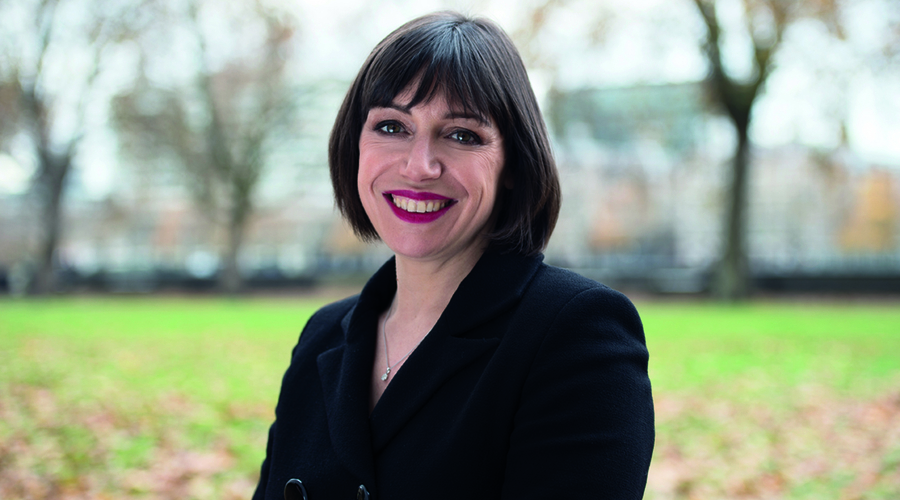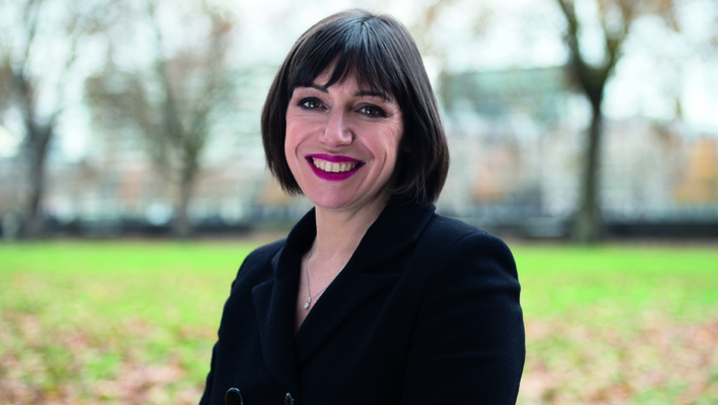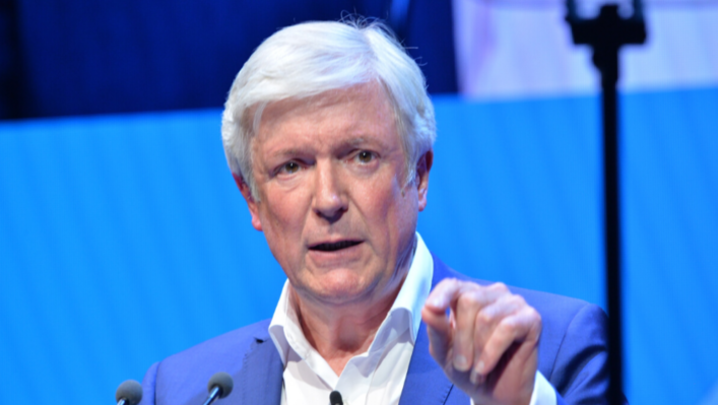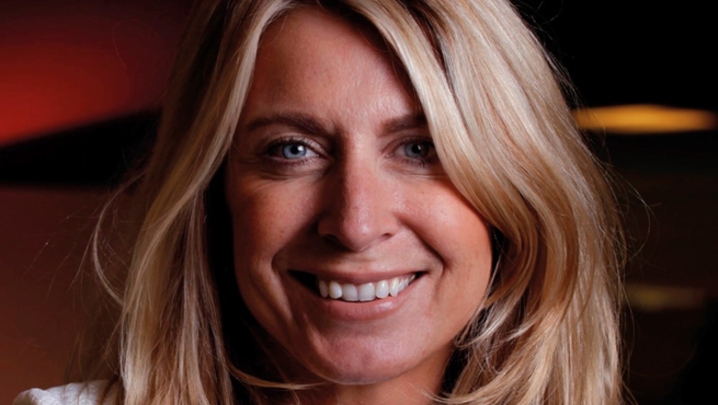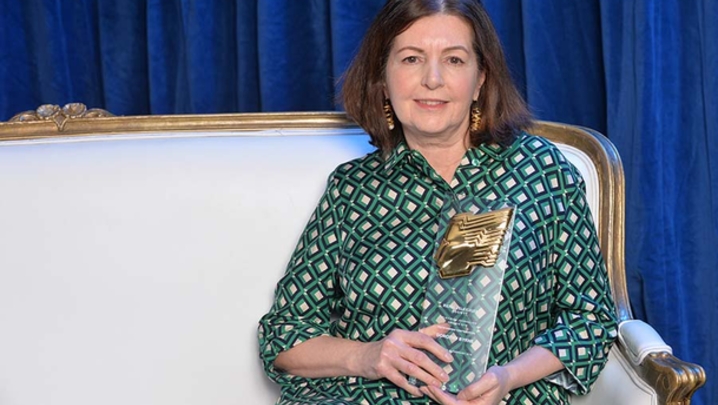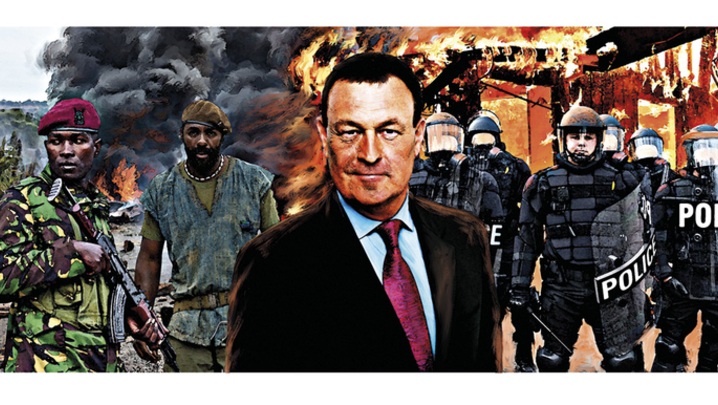Andrew Billen meets Sky’s new political editor, Beth Rigby, whose demotic style is lighting up Westminster
Beth Rigby is the stand-out political broadcaster of our times. This is despite the former print journalist having been on our screens for only three years. No one asks the acute, no-nonsense yet empathetic questions like the new political editor of Sky News. And no one does it in her accent.
She drops so many Gs that Rigby dreads party conferences in Birmin’ham. We worked together on the Times, where she was a scoop-winning media editor – and when I saw her first steps on Sky News I knew, as her bosses obviously did, that a star had been born.
She stands out visually, too. Accompanying her jet black hair and pale face, her blazing red lipstick is as potent an emblem of showbiz-meets-seriousness as Robin Day’s scarlet bow tie.
“You try,” she explains, “to have something that makes you distinguishable from other people. So Nick Robinson had his glasses and Andy Marr has his ears and Laura Kuenssberg has her really bright, sharp coats, and I, apparently, have my red lipstick. Actually, I used to wear bright lipstick all the time but in a number of different colours. There was orange and purple, whereas now it’s just red. It’s actually really helped. It gives you a signifier.”
We are in the café in the basement of 4 Millbank, from where Sky, like the BBC, runs its Westminster operation. It is our second attempt at a rendezvous. The first, in an Islington brasserie not far from her home, was thwarted by Gavin Williamson’s firing as Defence Secretary the day before. It was local election day and Rigby should have been chilling before a long night of results coverage, but her editor wanted her to chase him. She was mortified by her no-show. I understood entirely.
And, although she did not persuade Williamson to go on air, she did find him. Their conversation resulted in one of the more unusual enquiries Theresa May faced the following day. “Passing on”, she said, a question from Williamson, she asked if the PM would be giving him a copy of the Huawei leak report that resulted in his exit. In fact, she asked three times. May three times failed to reply.
Later that black Friday, she and May were in Aberdeen at a Scottish Conservative conference. Rigby had another question that you can’t imagine her rivals phrasing in quite the same way. May had lost her defence secretary and now 1,300 local councillors: “Are you feelin’ a bit upset?” It was colloquial, compassionate and also, somehow, funny.
"A minister recently told her that he was taking Diazepam because anxiety was stopping him sleeping"
She says she thinks very hard about how to frame questions that will elicit something from the PM other than a stock response from her mental “Rolodex”. “The best question I ever asked her, the one that got the best answer, was at the conference celebrating the 100-year anniversary of the women’s vote. I threw her an underarm ball and I said, ‘What advice would you give to your younger self?’ And she gave this really expansive answer and, at the end of it, there was this sort of spontaneous round of applause because she’d answered it as a woman with emotion and feeling. It cut through.”
Yet this is also the woman who, in January, buttonholed Boris Johnson after a late-evening Brexit vote and told him – after “a reality check” landed on her phone about Europe’s unwillingness to renegotiate the Northern Ireland backstop – that his “lot” were “deluded”. “It’s not happening. It’s not happening,” she told him. Boris blanched.
She addresses us, the viewer, with similar plain speaking. She has a first from Cambridge, so knows the art of precis, but still she will ring her father in Norfolk to check that he, and his “mates at the Feathers, who all watch Sky”, got the point she was making. “We get so [tangled up] in the weeds of the incremental developments in Westminster that what the viewer needs me to do is say, ‘There’s loads of noise but I’m going to zoom out and tell you three things you need to know’.”
She is amazed by the Prime Minister’s stamina, but some are amazed at hers. Like Kuenssberg, she works Mondays to Thursdays, but these are 12-hour days. They start with a bus journey to Westminster, during which she tackles her domestic admin, and, as I have witnessed, politics may not always conclude on a Thursday night after a two-way on Sky News at Ten.
A minister recently told her that he was taking Diazepam because anxiety was stopping him sleeping.
Does she ever lose sleep over Brexit? “No. I never lose sleep over it. Honestly, I mean, the only time I didn’t sleep was when I lost my mum, and when I was really heavily pregnant with my second child. I had insomnia. That was awful. “
Her mother, a headteacher, died of lung cancer, aged 62, 12 years ago, and she mourns the loss of that close friendship. Then, in 2016, her older brother, Alex, died of thymic carcinoma at the age she is now, 42.
“That was awful. Well, it still is, because we’re all still living through that. They had just had a little baby, his second child, and I know that makes it even more tragic but, actually, the fact that she was there and was a tiny baby meant we all just had to get on with it.”
He had been diagnosed in the April and died in August. She remembers speaking to him at the end of a long, exciting Sky News day, reporting on Boris Johnson’s withdrawal from the Tory leadership race. The news from Alex was bleak: the chemo had not worked. “I don’t know. It gives you a different perspective. Nothing is that big a deal. And you’ve got to just go for it.”
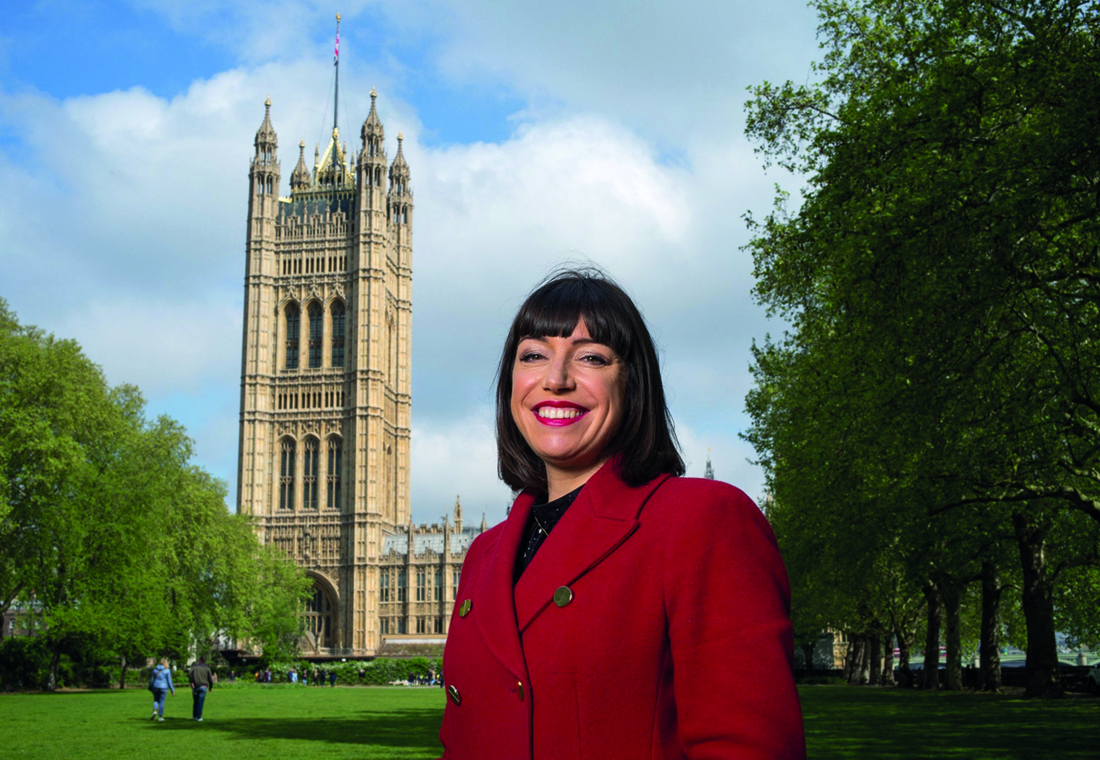
She was born in Essex but brought up in Buckinghamshire. Her father was a businessman, whose own father was a plumber.
She excelled at Beaconsfield High School, where she debated and danced (perhaps early indications of an inclination to perform). Winning a place at Cambridge, she studied social and political science.
She considered training as a barrister, entering politics (perhaps in a think tank) or a career as an academic.… “And then there was journalism.” In the end, she plumped for it, although, as a trainee on the Financial Times, she worked part-time for a while on its foreign desk while doing an MA in Latin American studies at London University.
“I kind of got that out of my system. I realised I could not write 100-page dissertations as a job,” she recalls. Thirteen years with the FT followed, initially reporting on hedge funds. She entered the lobby in 2010 as the paper’s chief political correspondent.
Back then, there were only two women journalists of her seniority in the lobby. “You look now, nine years later, and you’ve got Heather Stewart at the Guardian, you’ve got Pippa Crerar at the Mirror, you’ve got me and Laura on TV.”
Her former politics boss at Sky, Esme Wren, is now editor of Newsnight. “And introduced an all-women line-up of presenters. It’s changing.” That said, this former women’s officer at university is a member of the lobby’s woman’s group at Westminster, run by Kuenssberg.
“Television is a bit different from print. In print, men can be 80% of your correspondents. Who cares? No one. But on television, we’re all jigsaw pieces that fit into a brand.”
"Some people didn’t think I should be on television if I couldn’t talk properly. I was really upset"
In 2015, when she sought to widen her press experience by defecting to the Times, she told her husband, Angelo, that her media beat would be full-on. (Indeed it was, as it included breaking Robert Peston’s defection to ITV, the Kids Company scandal, and the freedom of information wrangle with the Government.) A graphic designer whom she met at a northern soul night, Angelo is 18 years her senior and was by then a freelancer and less in love with his career.
“I said, ‘I’ve got to make a bit of an impression and I’m going to have to throw myself into it. So, if you don’t mind not working, that would be easier for me.’ And he was like, ‘That’s fine.’” So, while she does the school run in the mornings and tries never to miss a parents’ evening, much of the daily burden of bringing up their nine-year-old son and seven-year-old daughter falls to him.

The approach to join Sky as senior political correspondent came from Wren and led to a meeting with head of Sky News John Ryley. “It was hard, because I hadn’t been at the Times for very long and I was genuinely enjoying it, but I thought, ‘Yes, I am coming over.’”
At first, viewers reacted mainly to her accent. “Some people thought I was putting it on. Some people didn’t think I should be on television if I couldn’t talk properly. I was really upset. I remember someone in Parliament, who I knew, went, “You’re really right for telly, but can you just stop dropping your Gs?”
“I did talk to Jonathon Levy [Sky’s head of newsgathering and operations] about it because I was upset, and he asked, ‘Well, what do you want to do?’ And I said, ‘I don’t know, really’”
In the end, she did nothing and declined media training. These days, she reads three words of a hostile tweet and mutes the tweeter. “But one person said, ‘You need electrocution lessons’, which I found absolutely hilarious. I re-tweeted that one.”
Once she reaches Millbank, her first appearance of the day is usually on All Out Politics, anchored by Adam Boulton, who did 25 years as Sky’s first political editor. Last year, during the Tory conference, a video was leaked of Boulton swearing at her off-air (“Sit down there. Stop f***ing around.”). He later apologised, but I wonder how relations are now. She says it was all a bit of miscommunication.
“Actually, he has been really supportive and really good to me and has given me great counsel and gives me loads of advice. We talk about stories and he gives me ideas and he phones me up with things he’s heard.”
There is no doubt, however, that Rigby is a break from the usual model of public schoolboy political editors (Boulton’s alma mater echoed to the chimes of Big Ben). Confronted by her questions, Westminster’s prevaricators and wafflers, euphemisers and half-truth tellers, sound even more out of touch.
Their hegemony, she believes, is on the wane: “You’re seeing a pattern now, where people are cutting through because they are authentic, if you like. Some go on television with the lines to take – ‘Here’s your briefing note, off you go’ – and they make no impact whatsoever. Then, you have a group of politicians who don’t quite do that. And it doesn’t mean being really disloyal to the leadership, it just means that you are trying to be genuine and answer questions.
“Jess Phillips does that. Lisa Nandy does that. She is not disloyal to Jeremy Corbyn, but she will say what she thinks – and she makes people think. Anna Soubry did it for the Conservative side. I think Johnny Mercer does it. Tom Tugendhat does it to an extent. I think Jacob Rees-Mogg does it.”
And on politics’s other side, Beth Rigby does it, too. She stands out and she cuts through.

